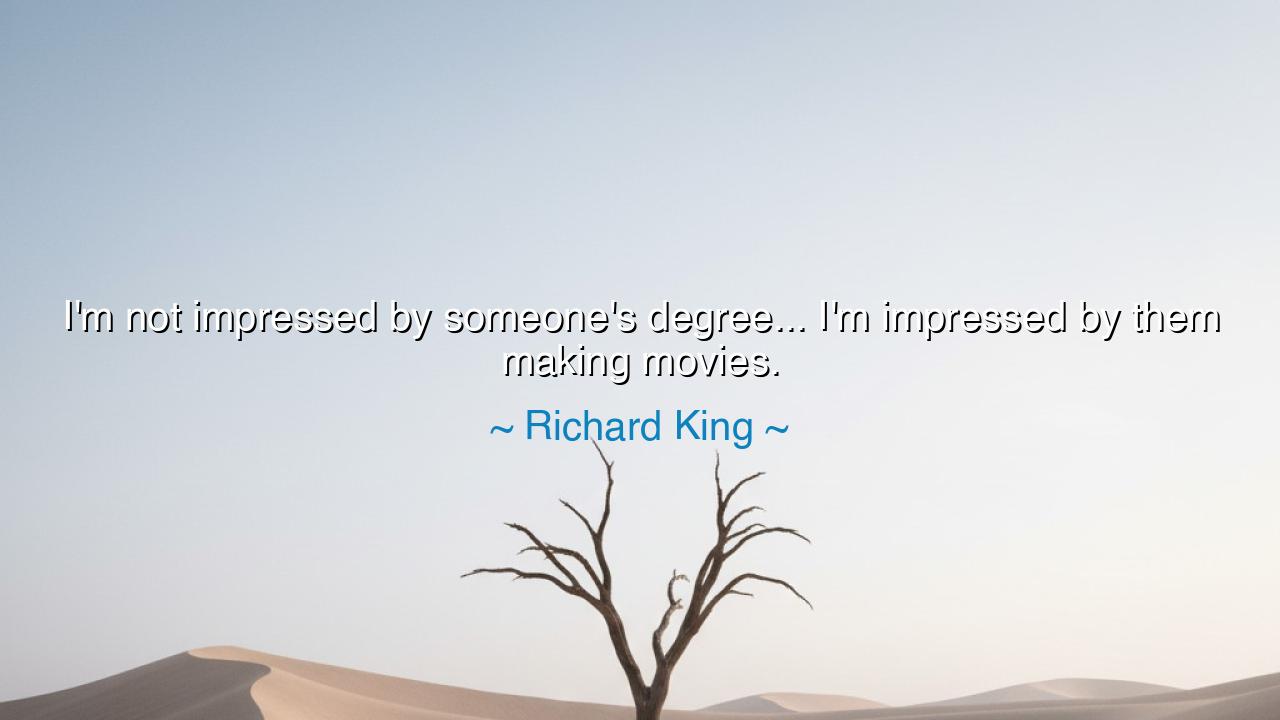
I'm not impressed by someone's degree... I'm impressed by them






The words “I’m not impressed by someone’s degree… I’m impressed by them making movies” spoken by Richard King strike at the very heart of action over credentials, practice over pretense, and accomplishment over appearance. Within this simple declaration lies a profound truth: that the measure of a person is not in the titles they have collected, the letters that trail their name, or the accolades they claim, but in the tangible work they have dared to create. King, a celebrated sound designer, speaks from the vantage of someone who understands that creativity and execution outweigh paper qualifications, for the world honors what is done, not what is promised.
In the style of the ancients, we may hear echoes of Aristotle’s teaching that virtue is not in potential, but in act. One is not wise simply by learning the doctrines of wisdom, but by living them in deeds. Likewise, King reminds us that the making of movies — a complex, collaborative, and daring art — is a test of character, of perseverance, of vision. Degrees, while worthy of respect, are symbols of preparation, not proof of mastery. To make something tangible — to create, to struggle, to bring imagination into reality — is to earn admiration that cannot be conferred by paper alone.
The origin of this insight lies in King’s life and work, for sound design is an arena where collaboration, innovation, and the execution of vision define success. In the movie world, a brilliant diploma is useless if it does not translate into the creation of a story, the shaping of sound, the transformation of silence into emotion. To see someone make a movie is to witness their skill, their commitment, and their courage — the alchemy of turning idea into reality. This is the crucible that separates theory from practice, ambition from achievement.
Consider the story of Orson Welles, who did not wait for academic accolades before transforming cinema with Citizen Kane. Though young and largely uncredentialed, Welles’ audacity, imagination, and execution commanded the world’s attention. Degrees and titles were irrelevant; it was the act of creation itself — the making of movies, the daring to innovate — that immortalized him. King’s words honor this principle: it is the courage to act upon knowledge, rather than the mere possession of it, that earns respect and influence.
There is also a moral lesson here about authenticity and integrity. A degree can suggest competence, but competence demonstrated through action is incontrovertible. When one makes a movie, one exposes one’s ideas, one’s vision, and one’s limitations to the judgment of the world. This vulnerability, this willingness to do rather than only know, is what impresses King. It is the distinction between the theorist who speaks of creation and the practitioner who brings it into being. The former may be clever; the latter is heroic.
Dear listener, the lesson is timeless: let your life be measured in deeds, not diplomas. Do not wait for titles to validate your worth, but instead, engage in the labor that transforms imagination into reality. Whether you make films, build structures, heal the sick, or write books, it is your action that defines you. Let your work speak louder than your credentials. The world remembers creators, not merely graduates.
This wisdom applies beyond cinema. Leonardo da Vinci had little formal education in comparison to his genius; yet through relentless observation, experimentation, and creation, he became immortal. Marie Curie and Thomas Edison alike show that daring to act — to invent, to explore, to create — surpasses the authority of certificates. Richard King’s words remind us that mastery is earned in the forge of endeavor, not in the halls of academia alone.
Finally, let King’s declaration inspire courage and action: do, create, and manifest your vision in the world. Honor study and preparation, but do not mistake them for accomplishment. Seek not admiration for letters behind your name, but for the tangible legacy you leave behind. In the end, it is not degrees that endure, but the fruits of action, the artifacts of courage, and the echoes of imagination made real — the very essence of a life well-lived.






AAdministratorAdministrator
Welcome, honored guests. Please leave a comment, we will respond soon